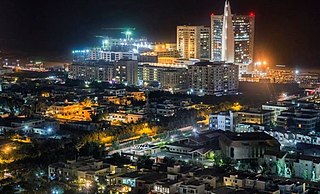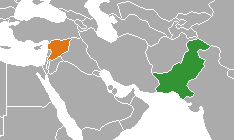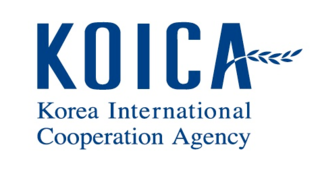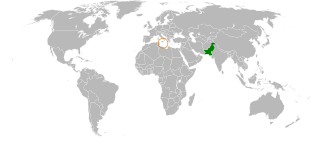Related Research Articles

The economy of Pakistan is classified as a developing economy. It is the 23rd-largest in terms of GDP based on purchasing power parity (PPP). In 2021, the country had a population of 227 million people. As of FY22, the nominal GDP of Pakistan stands at US$376 billion with a nominal GDP per capita of US$1,658 (177th); its GDP based on PPP stands at US$1.512 trillion with a GDP (PPP) per capita of US$6,662 (168th).

The economy of Senegal is driven by mining, construction, tourism, fishing and agriculture, which are the main sources of employment in rural areas, despite abundant natural resources in iron, zircon, gas, gold, phosphates, and numerous oil discoveries recently. Senegal's economy gains most of its foreign exchange from fish, phosphates, groundnuts, tourism, and services. As one of the dominant parts of the economy, the agricultural sector of Senegal is highly vulnerable to environmental conditions, such as variations in rainfall and climate change, and changes in world commodity prices.

The Economic Cooperation Organization or ECO is an Asian political and economic intergovernmental organization that was founded in 1985 in Tehran by the leaders of Iran, Pakistan, and Turkey. It provides a platform to discuss ways to improve development and promote trade and investment opportunities. The ECO is an ad hoc organisation under the United Nations Charter. The objective is to establish a single market for goods and services, much like the European Union. After the dissolution of the Soviet Union, the ECO expanded to include Afghanistan, Azerbaijan, Kazakhstan, Kyrgyzstan, Tajikistan, Turkmenistan, and Uzbekistan in 1992.

The Ministry of Finance and Revenue or Ministry of Finance is a ministry of the Government of Pakistan tasked to ensure a strong Pakistani economy by developing policies of sound economic management and providing expert advice to the government.

The State Bank of Pakistan (SBP) is the Central Bank of Pakistan. Its Constitution, as originally laid down in the State Bank of Pakistan Order 1948, remained basically unchanged until 1 January 1974, when the bank was nationalised and the scope of its functions was considerably enlarged. The State Bank of Pakistan Act 1956, with subsequent amendments, forms the basis of its operations today. The headquarters are located in the financial capital of the country in Karachi. The bank has a fully owned subsidiary with the name SBP Banking Services Corporation (SBP-BSC), the operational arm of the Central Bank with Branch Office in 16 cities across Pakistan, including the capital Islamabad and the four provincial capitals Lahore, Karachi, Peshawar, Quetta. The State Bank of Pakistan has other fully owned subsidiaries as well: National Institute of Banking and Finance, the training arm of the bank providing training to Commercial Banks, the Deposit Protection Corporation, and ownership of the Pakistan Security Printing Corporation.
Pakistan Post is a state enterprise which functions as Pakistan's primary and largest postal operator. 49,502 employees through a vehicle fleet of 5,000 operate traditional "to the door" service from more than 13,419 post offices across the country, servicing over 50 million people. Pakistan Post operates under the autonomous "Postal Services Management Board" to deliver a full range of delivery, logistics and fulfillment services to customers.

The National University of Management is a business school in Phnom Penh, Cambodia, located near Phnom Penh Railway Station. The university provides training programmes to all people in the areas of management, economics, commerce, IT, business law, tourism, and foreign languages, accompanied by research and development in response to the needs of the job market.

Nepal–Pakistan relations refer to the bilateral relations between Nepal and Pakistan, both Himalayan states located on the Indian subcontinent. After the Partition of British India in August 1947, Nepal moved to establish diplomatic relations with the Dominion of India, but did not do so with the Dominion of Pakistan. Official diplomatic ties did not exist between the two states until initial steps were taken on 29 March 1960; these relations were then fully established between 1962 and 1963. Both nations have since sought to expand their bilateral trade, strategic and military cooperation. In 1972, following Pakistan's defeat in the Bangladesh Liberation War and the secession of East Pakistan as the People's Republic of Bangladesh, Nepal recognized the latter's independence. Pakistan severed ties with Nepal shortly afterwards, but these were later re-established.

Cuba–Pakistan relations refers to the bilateral relations between Cuba and Pakistan. Cuba has an embassy in Islamabad and Pakistan has an embassy in Havana. Relations between the countries strengthened after Cuba provided humanitarian assistance to the victims of the 2005 Kashmir earthquake.

The National Institute of Banking and Finance (NIBAF) is a subsidiary of the State Bank of Pakistan (SBP) head by the managing director, a board of directors and the governor of State Bank of Pakistan. NIBAF, a non-profit organisation, aims at providing training and development to central and commercial bankers at national as well as international level. One of its important roles is to develop human capital of SBP and its subsidiaries. It has trained 140 participants from friendly countries through 22 weeks of training during the financial year 2006-07.

Pakistan formally consummated diplomatic ties with Kyrgyzstan on May 10, 1992, although relations were initially founded on December 20, 1991, shortly after Kyrgyzstan became independent of the Soviet Union. Consequently, Pakistan opened its diplomatic outpost in Bishkek in 1995.

Pakistan–Syria relations are the historic, international, and bilateral relations between Syria and Pakistan. Syria has an embassy in Islamabad. Pakistan is represented in Syria through its embassy in Damascus. Through the ancient civilization exchange, areas of modern Pakistan were part of the silk route with the Syria and for centuries, Syrian Islamic missionaries that introduced Islam in the parts of now integrated in Pakistan after 711 AD were from Syria.

Relations between Algeria and Pakistan are excellent. Pakistan was one of the first countries to recognize the Provisional Government of Algerian Republic and its mission was opened in Karachi, the then capital of Pakistan in 1958. Both sides have convergence of views on issues of international importance. Both countries have also been supporting each other in various multilateral forums including UN, OIC and NAM. Algeria has an embassy in Islamabad and Pakistan has an embassy in Algiers.

Germany–Pakistan relations are the bilateral relations between the Federal Republic of Germany and the Islamic Republic of Pakistan. The two states established diplomatic relations in the 1950s, with a focus on social, educational and economic development. Despite strong co-operation and historical ties, the two nations have experienced growing tensions, primarily due to disagreements and differing policies regarding the War in Afghanistan, including as the post-2014 drawdown and 2021 withdrawal of United States-led coalition troops. Germany remains one of Pakistan's largest trading partners.

Kenya–Pakistan relations entails the bilateral relations between Pakistan and Kenya. Both countries are members of the Commonwealth of Nations.

The Korea International Cooperation Agency was established in 1991 by the Ministry of Foreign Affairs of South Korea as a governmental organization for Official Development Assistance (ODA). KOICA's goal is to enhance the effectiveness of South Korea's grant aid programs for developing countries by implementing the government's grant aid and technical cooperation programs. KOICA is led by three-year-term president of the board who is appointed by the President upon the recommendation of Foreign Minister.

Malta–Pakistan relations are the bilateral relations between Malta and Pakistan.

The Privatisation process in Pakistan is a continuous policy measure program in the economic period of Pakistan. It was first conceived and implemented by the then-people-elected Prime Minister Nawaz Sharif and the Pakistan Muslim League, in an attempt to enable the nationalised industries towards market economy, immediately after the economic collapse of the Soviet Union in 1989–90. The programme was envisaged and visioned to improve the GDP growth of the national economy of Pakistan, and reversal of the nationalisation programme in 1970s— an inverse of the privatisation programme.

Mauritius–Pakistan relations refer to bilateral relations between Mauritius and Pakistan. Pakistan has a high commission in Port Louis, whilst Mauritius has a high commission in Islamabad.
Indian Technical and Economic Cooperation Programme (ITEC) is a bilateral assistance programme run by the Government of India. It is a demand-driven, response-oriented programme that focuses on addressing the needs of developing countries through innovative technological cooperation between India and the partnering nation. Along with its corollary the Special Commonwealth Assistance for Africa Programme, ITEC covers 158 countries across Asia, Africa, Latin America, Central and Eastern Europe, and several Pacific and Caribbean nations. Since its inception, the programme has spent over US$ 2 billion and benefited thousands of students and professionals from around the globe and annual expenditure on the programme has averaged US$ 100 million per annum in recent years.
References
- ↑ "Economic Affairs Division - Government of Pakistan". 202.83.164.25. Archived from the original on 4 December 2012. Retrieved 3 February 2022.
- ↑ More information on PTAP Archived 2017-11-11 at the Wayback Machine , Embassy of Pakistan in Washington, D.C.
- ↑ "Archived copy" (PDF). Archived from the original (PDF) on 2012-11-05. Retrieved 2014-01-07.
{{cite web}}: CS1 maint: archived copy as title (link)